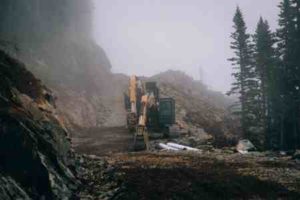A document leaked to the Unist’ot’en, which this reporter has seen, provides direct evidence that Moricetown Band Council has been negotiating to become part of the First Nations Limited Partnership (FNLP). FNLP is the body created by Pacific Trails Pipeline (PTP) to garner indigenous support by providing shares in the pipeline project and financial benefits.
The document in the form of a letter dated July 28, 2014 is addressed to the chief of the Moricetown Band Council and signed by a Pacific Trail Pipeline vice president with Apache and Chevron letterhead. It claims to outline Apache and Chevron’s understanding of the terms discussed.
These include
-
financial payments totalling 20.4 million dollars over 35 years
-
numerous contract opportunities for Moricetown based companies, including the contract for clearing and creating road access for the eastern 380 kilometres of PTP
-
training opportunities and incentives
-
a security bridge to be established by a Moricetown based-company on the Morice River West bridge (current site of the Unist’ot’en Camp)
-
a “no oil covenant” which would prohibit PTP from selling the pipeline to an oil company for five years
Regardless of the content of the proposed agreement, even if it were to be finalized, it is illegal by Wet’suwet’en law, according to Freda Huson, Unist’ot’en Clan member and spokesperson for Unist’ot’en Camp.
“No Band Councils or Tribal Councils have jurisdiction over Unist’ot’en territory. The only people that can make a decision on Unist’ot’en territory are Unist’ot’en people. We have jurisdiction, have proved it in the Dalgamukh, and we’ve never given over that juridiction to the province, the federal government, band councils or tribal councils.”
Furthermore, Huson suspects that many of the people in attendance at the meetings didn’t actually consent to any of the terms being put forward by PTP.
“I’ve actually phoned people who were in attendance at that meeting because they were falsely trying to say that Knedebeas was in agreement because they were talking about our territory. He’s our head chief and when I spoke to him he didn’t say he had agreed to anything in those meetings. I spoke to another one of the chiefs that were invited to the meeting and he said that he was attending the meetings to ask legitimate questions. He wasn’t agreeing or saying no to either parties side. So there’s some shady stuff happening because I’m getting conflicting messages from the various people that were in attendance at these meetings.”
The document has also served as a source of some startling revelations, including the possibility of converting the pipeline to carry oil.
“One of the major clauses that caught our attention in that agreement is that it is explicit that the company can sell their pipeline assets to a bitumen company after five years,” says Toghestiy, a Wet’suwet’en hereditary chief from the Laksamisu clan. “That immediately tells me that there is a larger game going on here, that there is something much like a trojan horse with the LNG projects to get the bitumen pipelines through.”
Toghestiy has long been critical of the way NGO and mainstream environmental campaigns have been fixated on specific projects in isolation, such as Enbridge Northern Gateway.
“We’ve been quite insistent that we’re not stopping one pipeline, we’re stopping all of them. Because they’re one big machine. It’s obvious now with the disclosure of this agreement that oil and gas are basically the same. The Pacific Trails Pipeline was planning on selling their assets to a bitumen company that was interested in transporting bitumen after five years. And if Enbridge decides to admit defeat, who are they going to go to buy the pipeline from, and who’s gonna sell it? It’s really obvious now.”
In terms of the ability of the Moricetown Band to establish a security gate on their territory or being able to allow PTP access to the territory, Freda Huson is adament that is not going to happen.
“They won’t be crossing our territory. We’ve already said no. No means no. There’s no negotiating. We’re not holding out for them to give us some money. We don’t want their blood money because we’re protecting our waters, our wildlife, our land for generations ahead.”
by Brett Rhyno / Vancouver Media Co-op
